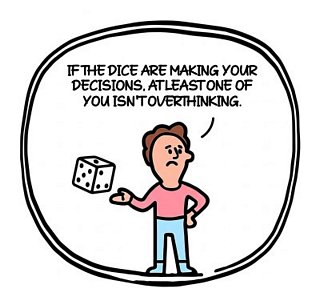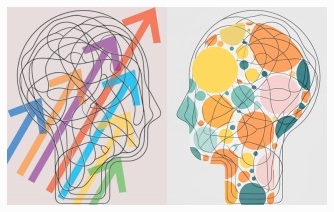 Procrastination isn’t just waiting—it’s the surrender of agency.
Procrastination isn’t just waiting—it’s the surrender of agency.
It’s not a delay of action—it’s a relinquishing of will.
The clock is indifferent to your hesitation, but your conscience is not.
Tasks rarely demand much time. They’re often quicker than you imagine, if measured by the minute. But what drags them out is the internal struggle: overthinking, fear, distraction.
That quiet battle inside your mind is the real delay—not the work itself, but the resistance before it. That battle—not the task—is what drains you.
Delay isn’t about duration; it’s about hesitation.
Do things fast—not recklessly, but with intention.
Start, and it’s swift. Stall, and it stretches endlessly, draining energy and time.
Action creates traction. With that, momentum grows.
 Life’s a series of trade-offs; each choice has an opportunity cost—
Life’s a series of trade-offs; each choice has an opportunity cost— We rely on to-do lists to organize our tasks, yet they often
We rely on to-do lists to organize our tasks, yet they often  It’s a curious feature of our age that we still require, by law, ashtrays in the lavatories of commercial aircraft. Not because we’re nostalgic for the days when the skies were thick with the fug of unfiltered Marlboros, but because—despite decades of prohibition—someone, somewhere, will inevitably decide the rules
It’s a curious feature of our age that we still require, by law, ashtrays in the lavatories of commercial aircraft. Not because we’re nostalgic for the days when the skies were thick with the fug of unfiltered Marlboros, but because—despite decades of prohibition—someone, somewhere, will inevitably decide the rules  If you haven’t been tracking your personal finances, kick off with a Personal Net Worth Spreadsheet. It’s not revolutionary, but it is relentlessly revealing. The purpose is clear: record what you own, subtract what you owe, and face the unvarnished truth of the remainder. That number is your net worth—untainted by narrative or intention. It can’t flatter. It won’t excuse. It simply reveals.
If you haven’t been tracking your personal finances, kick off with a Personal Net Worth Spreadsheet. It’s not revolutionary, but it is relentlessly revealing. The purpose is clear: record what you own, subtract what you owe, and face the unvarnished truth of the remainder. That number is your net worth—untainted by narrative or intention. It can’t flatter. It won’t excuse. It simply reveals.
.jpg)
 There’s an old joke about the Soviet Union’s approach to industrial planning. It’s been told so often it’s
There’s an old joke about the Soviet Union’s approach to industrial planning. It’s been told so often it’s  We romanticize transformation—new routines, cleaner diets, sharper habits. But in practice, change rarely arrives in cinematic sweeps. It comes in quieter forms: a switch from soda to water, a walk around the block, skipping the evening snack. Small choices. Easily overlooked. In aggregate,
We romanticize transformation—new routines, cleaner diets, sharper habits. But in practice, change rarely arrives in cinematic sweeps. It comes in quieter forms: a switch from soda to water, a walk around the block, skipping the evening snack. Small choices. Easily overlooked. In aggregate,  We make thousands of decisions daily—what to wear, which email to answer first, whether to take the scenic route or stick to the main road. Most are low-stakes, but the act of choosing can sap mental energy. That’s
We make thousands of decisions daily—what to wear, which email to answer first, whether to take the scenic route or stick to the main road. Most are low-stakes, but the act of choosing can sap mental energy. That’s  A thing can feel bad and be right.
A thing can feel bad and be right.